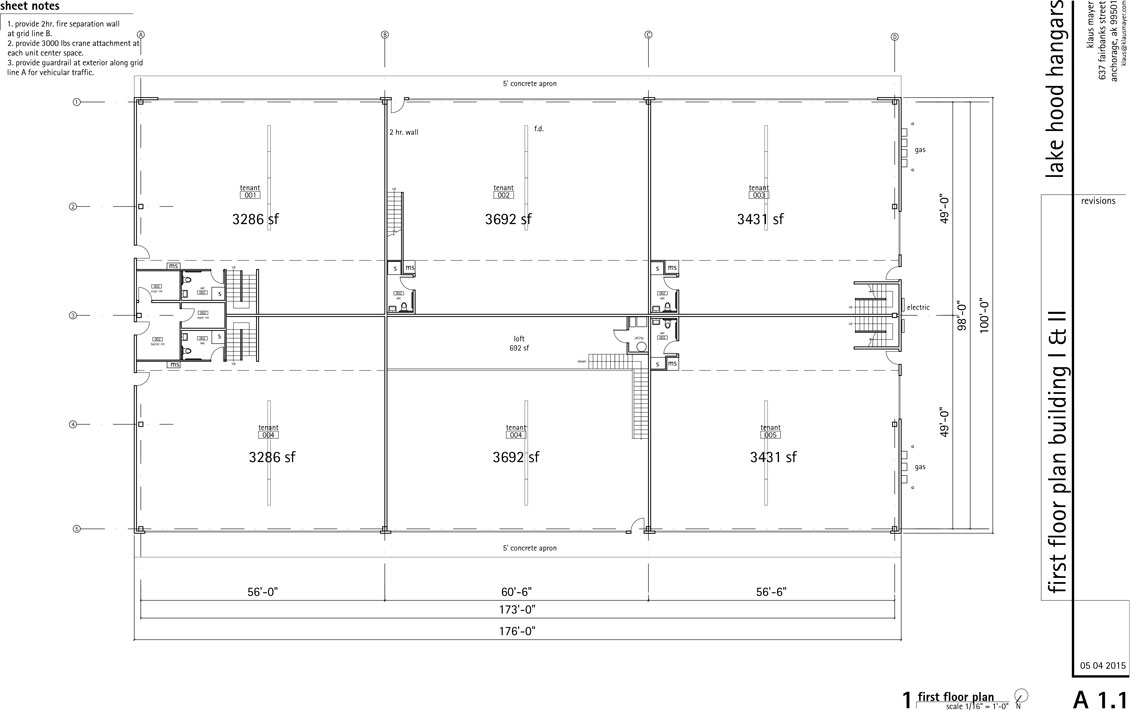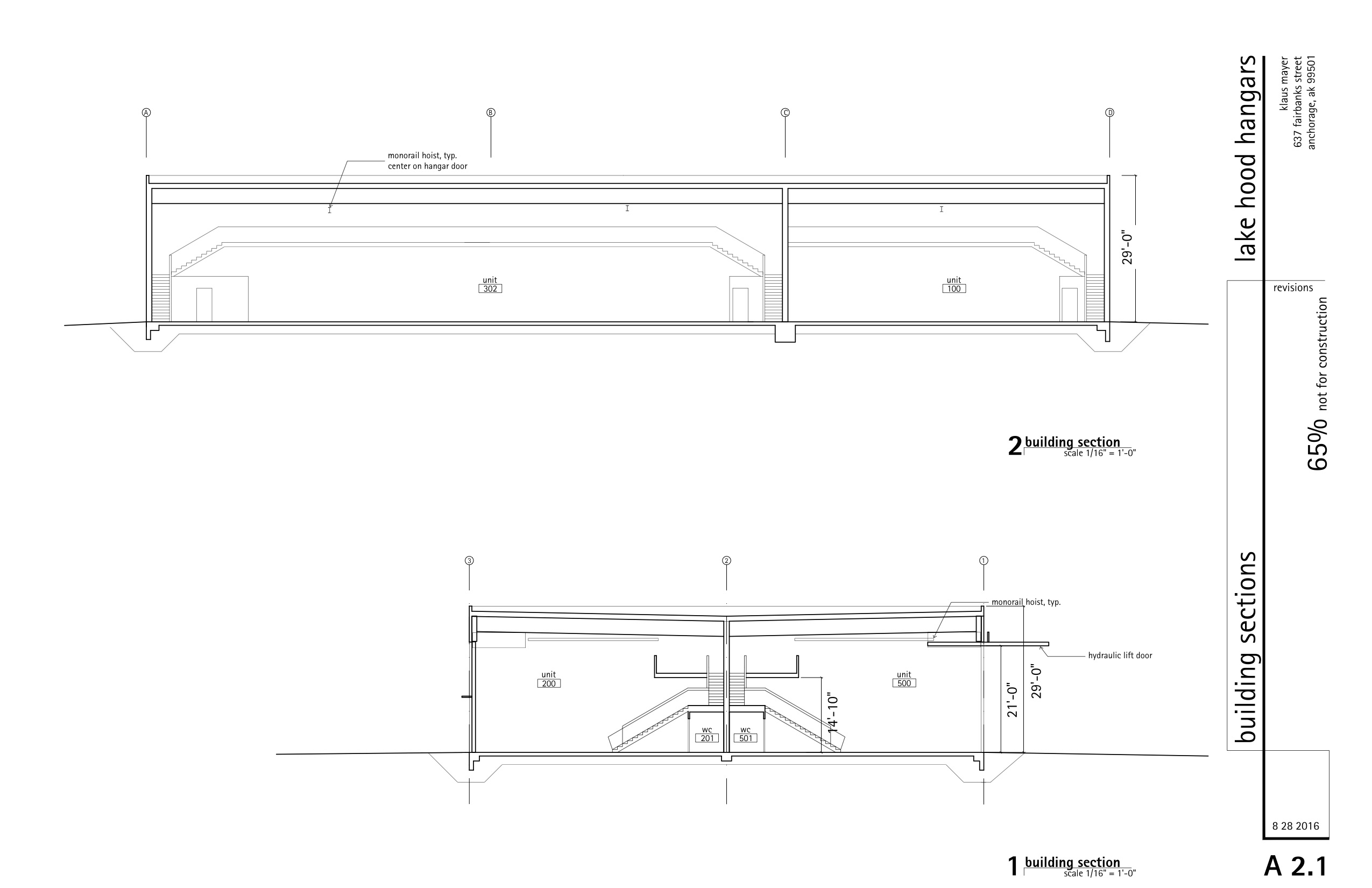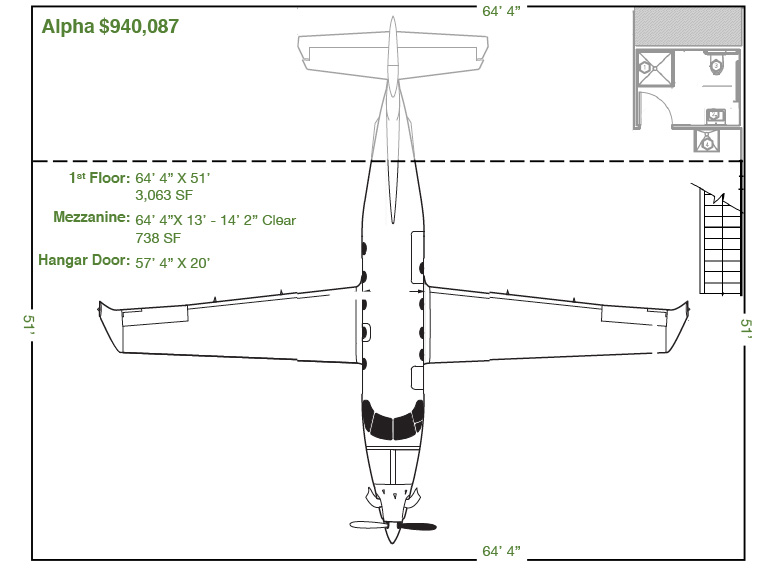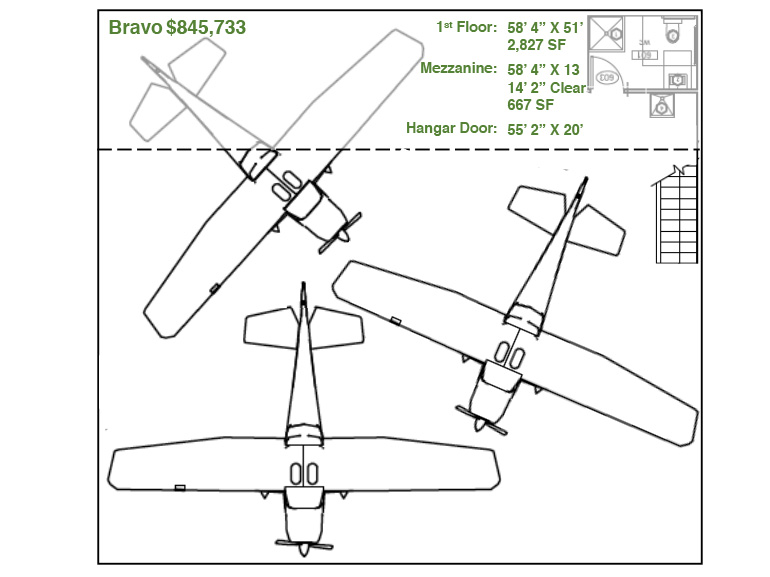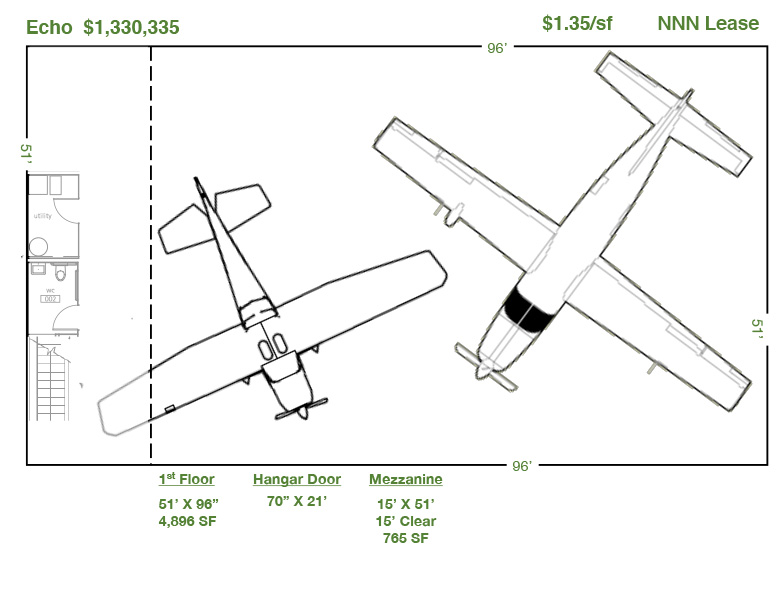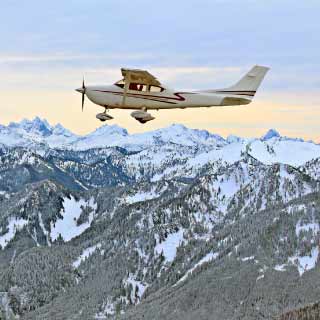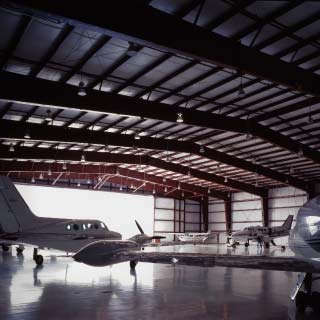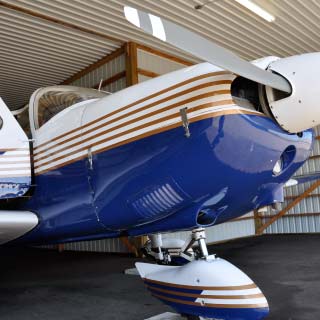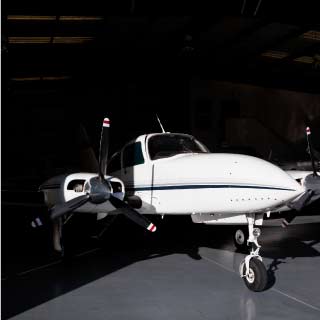Frequently Asked Questions
- Q.1 When will construction of the hangars begin and when will it be completed?
- Q.2 What are the advantages of buying a hangar?
- Q.3 Is a hangar at Lake Hood a good investment?
- Q.4 Is financing available? What about leasing?
- Q.5 How do I receive periodic updates on construction progress, hangar availability, pricing, etc.?
- Q.6 Are there rules and regulations governing the use of the hangar?
- Q.7 How does the Owner's Association work?
- Q.8 What are typical permitted uses of the hangars?
- Q.9 How are the hangar utilities configured and metered?
- Q.10 After I acquire my hangar, what additional costs can I expect?
- Q.11 How will the insurance be handled?
- Q.12 How is title to my hangar held and do I own the land?
- Q.13 What is the term of the ground lease?
- Q.14 How about after-hours access?
- Q.15 Where will I park my car?
- Q.16 Can two partners acquire a hangar?
- Q.17 How can the mezzanine be utilized?
A.1 When will construction of the hangars begin and when will it be completed?
Construction will begin when enough hangar units in a building have secured sale or lease commitments to satisfy construction lender requirements which is anticipated to be 60% to 70% of the units. Obtaining remaining permitting approvals and construction will be completed in approximately 10-12 months.
Construction of Building #1 began in March 2017 – it will be complete and ready for occupancy by the end of the year. A couple of units may still be available – reserve your unit now!
Ready to reserve your hangar in Building 2 or 3? Reserving your hangar now ensures that you get the unit that you want and have the ability to customize and upgrade your hangar during construction.
A.2 What are the advantages of buying a hangar?
There are many advantages to purchasing a hangar at Lake Hood Hangars. Here are just a few:
- Your hangar purchase is an appreciating real estate investment - all the appreciation in the value of the unit over time will benefit you directly when you choose to sublet or resell your leasehold interest.
- Instead of renting, you own your hangar unit as a member of the Lake Hood Owner's Association, Inc.
*pursuant to a long-term ground lease agreement with the State of Alaska Department of Transportation and Public Facilities Ted Stevens Anchorage International Airport (the “Airport")
- You can configure your hangar space to match your needs, now or in the future.
- At any time, you can sell, rent or lease your hangar to another party
*subject to approval by the Airport*
A.3 Is a hangar at Lake Hood a good investment?
Yes! Demand for hangars at Lake Hood Seaplane Base exceeds supply—units rarely become available for lease or for sale. Lake Hood Hangars offers a superior address – located at the corner of Victor Taxilane (TWV) and Aircraft Drive. Direct access to TWV provides access to the paved runways at Ted Stevens Anchorage International Airport, the public ramp to the waterlanes in Lake Hood/Lake Spenard, and access to the dirt strip 14-32 via Lakeshore Taxiway. Lake Hood Hangars allows for multiple types of users including business and private. Aircraft storage includes both fixed-wing and rotary-wing aircraft.
Advantages of ownership may include:
- Tax benefits such as depreciation for business use
- Capital appreciation
- Fully transferable asset—sale or lease to third parties permitted
- Ability to utilize sale proceeds in a 1031 tax-deferred exchange of like-kind property (such as selling another hangar or other real estate)
- Protect your investment – cars and trucks enjoy garages – why should your aircraft be subject to Alaska's weather and outside variables?
Substantial barriers to new development at Lake Hood and other airports include:
- Lack of available or developable land
- Permitting and entitlements can take years to obtain
- FAA regulations/approvals
- Community opposition to new development
Continuing demand, advantages of ownership and constraints on new supply all combine to make an investment in the Lake Hood Hangars an excellent decision!
A.4 Is financing available? What about leasing?
Bank Financing: Local banking institutions are willing to offer long-term financing for hangar purchasers. The Small Business Administration also offers financing for qualified borrowers.
Seller Financing: The Seller is offering to finance hangars to qualified buyers with acceptable terms.
1031 Tax-Deferred Exchange: Own a hangar and need to upgrade? Consider the advantages of a 1031 tax deferred exchange and use your sale proceeds to finance your new hangar. We are familiar with the process, willing to participate, and have industry associates that specialize in the 1031 transactions and are able to facilitate your closing.
Lease: Hangar purchase too expensive? Consider leasing a unit – we offer lease rates starting at $1.35/sf NNN with rent incentives for long term leases 5+ years.
Lease with Option to Purchase: Not sure if you want to commit to a purchase? Lease with an option to buy in the first two years.
A.5 How do I receive periodic updates on construction progress, hangar availability, pricing, etc.?
Contact us. By registering, you will receive periodic email status and construction reports about the project.
A.6 Are there rules and regulations governing the use of the hangar?
In addition to the permitted use; Airport rules and regulations and the Lake Hood Hangars Owner's Association may impose rules and regulations governing uses and activities in common areas, alterations of building exteriors, etc.
A.7 How does the Owner's Association work?
The Lake Hood Hangars Owner's Association is incorporated in the State of Alaska and governed by a Board of Directors elected by the hangar owners who will be members of the Lake Hood Hangars Owner's Association. The Association will be formed for the purpose of exercising the powers and performing the duties of the Association set forth in the Bylaws, the Articles of Incorporation of the Association and the Declaration of Covenants, Conditions and Restrictions; preserving, protecting and enhancing the values and amenities of the Project; and promoting the health, safety and welfare of the Members of the Association. The Lake Hood Hangars Owner's Association will be responsible for the day-to-day management and maintenance of the hangar facilities.
A.8 What are typical permitted uses of the hangars?
The hangar units are to be used for inside storage, maintenance, repairs, loading and unloading of air-worthy general aviation aircraft; and uses incidental to the aviation uses above such as limited storage and office space that do not interfere with the primary purpose of the hangar.
A.9 How are the hangar utilities configured and metered?
Electricity: 120/240 volt three-phase electrical service to each building with individual meters to each unit.
Natural Gas: Separately metered natural gas meters for each unit.
Water & Sewer: Water and sewer metered at each building.
A.10 After I acquire my hangar, what additional costs can I expect?
The price of your hangar will provide you with exclusive use of your hangar space for the life of the ground lease.
In addition to the purchase price of a unit, purchasers can expect to pay their prorata share (based on the square footage of the first floor area of each unit as a percentage of the total building/project square footage) for the maintenance and operation of the buildings and common area improvements including:
- Airport Ground Rent
- Maintenance & Upkeep of the Common Areas
- Property and Liability Insurance of the Buildings
- Real Estate Taxes
- Operating Reserves
Based on a preliminary budget for the association, owners can expect to pay about $3.60 per unit floor square foot per year in quarterly installments. For example, annual assessments would range from $12,500 for the smallest hangar unit to $14,500 for the largest unit, based on a 6-unit configured building.
Unit Owners will contract for and pay directly for natural gas, electricity, refuse removal, janitorial services, interior unit maintenance, communications services, insurance on their contents inside of the unit, and other services that may be desired or required inside of the unit.
A.11 How will the insurance be handled?
The overall building and general liability insurance policy premium will be included in the common charges passed on to each owner based on their prorata square footage. Unit Owners are responsible for procuring and paying for insurance on the contents inside of the unit.
A.12 How is title to my hangar held and do I own the land?
Title to the building improvements is vested with Lake Hood Hangars Association, Inc. (“LHHAI", a leasehold cooperative comprised of the Unit Owners). The land is subject to a long-term ground lease with the Airport. Unit purchases are contingent upon approval from the Airport, and will be conveyed by proprietary lease and the purchase of membership interests of Lake Hood Hangars Association, Inc. Each buyer will receive a membership certificate and proprietary lease at closing. Closing will be coordinated by a title company and title insurance available for the leasehold interests of the buyer. LHHAI has a long-term ground lease with the Airport. At closing, each hangar owner will enter into a long-term proprietary lease with LHHAI for a specific portion of the building (unit) for the duration of the ground lease. Provisions have been made in the documentation allow the transfer of the operations of the facilities to LHHAI (comprised of owners), once all of the units have been sold.
Buyers will receive a copy of the Public Offering Statement when signing a purchase and sale agreement for a unit – it is the Buyer's responsibility to carefully review and become familiar with the documentation and disclosures in the Public Offering Statement and the Declaration.
A.13 What is the term of the ground lease?
The lease term is 55 years after all three buildings are built. The lease rate is $0.12 per square foot annually. Actual ground lease payments may vary by unit and are included in the owner's association assessments.
A.14 How about after-hours access?
Each owner will have 24-hour access to their hangar unit.
A.15 Where will I park my car?
Options include parking inside your hangar unit or in the parking spaces on the east side of the property along Aircraft Drive.
A.16 Can two partners acquire a hangar?
Yes. The proprietary lease and membership certificate will be with a single entity, and any lawful business arrangement that you and your partner/partners wish to put together is fine. A good strategy may be to have two or more partners, each with an interest in an LLC that is the proprietary lessee, each with their own aircraft, purchase a single hangar that will accommodate all aircraft. This approach provides all the benefits of owning your own hangar at approximately 50% or even 33 1/3% of the investment.
A.17 How can the mezzanine be utilized?
Tenant improvements could include:
- Conference room
- Kitchen
- Flight planning room
- Media room
- Office(s)
- Pilot lounge
- Reception area
- Break Area
- Flight planning & preparation space
- Storage Loft
- Crew Break Area
- Second bathroom/shower
